-
ORIGINAL ARTICLE11-26-2022
Transitional care of nurses to older adults with artificial pacemaker
Revista Brasileira de Enfermagem. 2022;75:e20210192
Abstract
ORIGINAL ARTICLETransitional care of nurses to older adults with artificial pacemaker
Revista Brasileira de Enfermagem. 2022;75:e20210192
DOI 10.1590/0034-7167-2021-0192
Views0See moreABSTRACT
Objective:
to understand how the transitional care of nurses to olde adults with artificial pacemaker occurs.
Method:
a qualitative research, carried out in a philanthropic hospital in the city of Salvador, Bahia, Brazil. Fourteen nurses working in surgical and cardiac inpatient units participated. Data were collected between August and November 2020, through semi-structured interviews, and analyzed using the methodological framework Discourse of the Collective Subject and discussed in the light of Afaf Meleis’ theory of transitions.
Results:
nurses’ incipient knowledge about transitional care was identified. It was observed that the nursing discharge report is a facilitating instrument for transitional care.
Final considerations:
the study pointed out that the transitional care of nurses to older adults with artificial pacemakers does not have a theoretical foundation, reporting as a priority the care with the pacemaker identification card and with the surgical wound.
-
ORIGINAL ARTICLE11-26-2022
Mental health assistance in Primary Care: the perspective of professionals from the Family Health Strategy
Revista Brasileira de Enfermagem. 2022;75:e20190326
Abstract
ORIGINAL ARTICLEMental health assistance in Primary Care: the perspective of professionals from the Family Health Strategy
Revista Brasileira de Enfermagem. 2022;75:e20190326
DOI 10.1590/0034-7167-2019-0326
Views0See moreABSTRACT
Objective:
To learn about the perceptions of the professionals who work in Primary Health Care about mental health care.
Methods:
Descriptive and qualitative study, carried out with 29 health workers through open and individual interviews. The IRaMuTeQ® software was used to organize the data which, then, was submitted to a content analysis process in the thematic modality.
Results:
Three classes emerged from the content analysis: “Perceptions about the mental health care provided in the city”, “The biomedical paradigm in mental healthcare”, and “Elements for the construction of a new way for professionals to act in mental health”.
Final considerations:
It was found that, despite the good infrastructure of the services and the elements pointed at by the professionals to create a new way to act, they do not do so, and the responsibility falls, mostly, on the psychologist to carry out these activities.
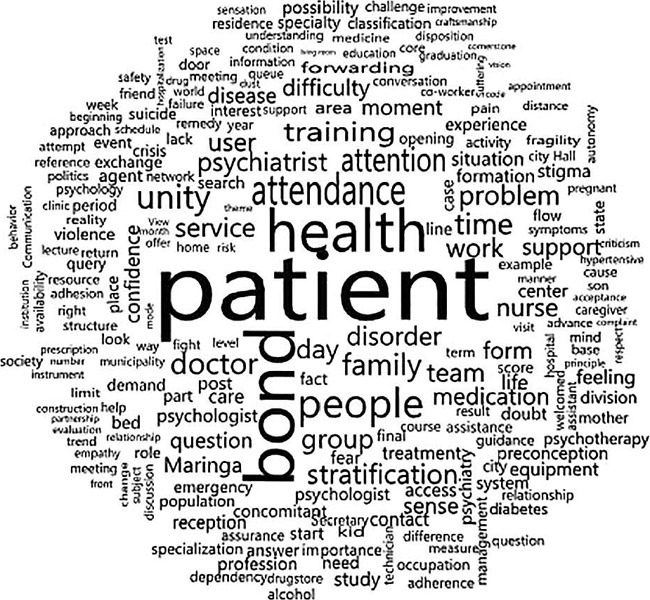
-
REVIEW11-26-2022
Parental burnout: a scoping review
Revista Brasileira de Enfermagem. 2022;75:e20210203
Abstract
REVIEWParental burnout: a scoping review
Revista Brasileira de Enfermagem. 2022;75:e20210203
DOI 10.1590/0034-7167-2021-0203
Views0See moreABSTRACT
Objective:
to map available evidence on parental burnout theme.
Method:
scoping review as according to the Joanna Briggs Institute. Search in January 2021, in six databases of publications in English, Portuguese or Spanish, without time limits. Data extracted and descriptively analyzed by three independent researchers.
Results:
374 articles were identified and 20 were included in the final sample, all published in English, from 2017 onwards. Parental burnout is a complex, multifactorial problem, distinct from burnout cases, depressive symptoms and other mental health alterations. It affects 0.2 to 20% of parents, has validated and suitable instruments for measurement; if not treated, can have consequences on marital life, work relationships, child neglect and violence.
Conclusions:
this is a recent theme that needs to be explored, due to the possible impact on children’s and families’ health and on parents’ work processes. Protocol registered in the Open Science Framework ().
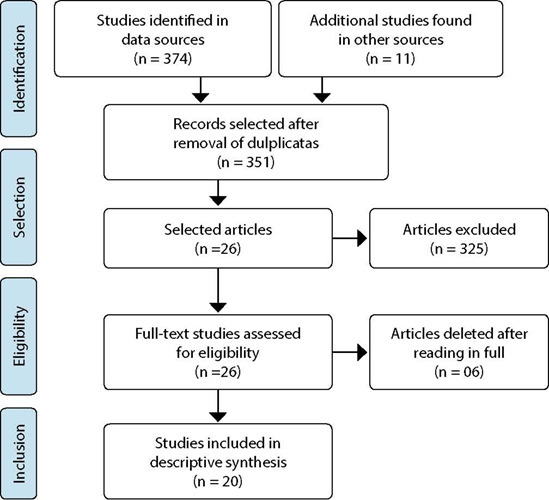
-
ORIGINAL ARTICLE11-26-2022
Religiosity and spirituality in mental health: nurses’ training, knowledge and practices
Revista Brasileira de Enfermagem. 2022;75:e20200345
Abstract
ORIGINAL ARTICLEReligiosity and spirituality in mental health: nurses’ training, knowledge and practices
Revista Brasileira de Enfermagem. 2022;75:e20200345
DOI 10.1590/0034-7167-2020-0345
Views0See moreABSTRACT
Objective:
to analyze nurses’ training, knowledge and practices in the religiosity/spirituality interface in the context of Psychosocial Care Centers.
Methods:
a descriptive, exploratory, qualitative study, carried out in a metropolitan region of Ceará. Four nurses were interviewed, and the data were examined using the content analysis technique.
Results:
four categories emerged from analysis: Deficit in teaching religious and spiritual practices in higher education in nursing; View of the concept of religiosity and spirituality; Religiousness and spirituality as an integral part of the person; Reception of religious and spiritual practices as an aid to treatment.
Final considerations:
a deficit in nursing undergraduate teaching was identified concerning religiosity and spirituality. However, the interviewed professionals understand the importance of religious and spiritual dimensions in the therapeutic process, even though they do not accurately differentiate the concepts.
-
ORIGINAL ARTICLE11-26-2022
Health beliefs and adherence of the elderly to fall prevention measures: a quasi-experimental study
Revista Brasileira de Enfermagem. 2022;75:e20201190
Abstract
ORIGINAL ARTICLEHealth beliefs and adherence of the elderly to fall prevention measures: a quasi-experimental study
Revista Brasileira de Enfermagem. 2022;75:e20201190
DOI 10.1590/0034-7167-2020-1190
Views0See moreABSTRACT
Objective:
To evaluate the effect of an educational intervention on health beliefs and adherence of elderly people to fall prevention measures.
Methods:
This is a quasi-experimental study, carried out at the Senior Citizens’ Center. Sixty-eight elderly completed the intervention. The intervention consisted of four meetings focused on beliefs about falls and prevention, and the evaluation occurred at baseline and 30 days after completion.
Results:
The elderly were predominantly women (83.82%), with one to four years of schooling (36.76%), with health problems (95.59%), and 48.53% had fallen. There was a significant increase in perceived susceptibility, severity, benefits, barriers, and total health belief score post educational intervention. By adding total to partial adherence, there was a significant increase in the adherence of the elderly to fall prevention measures after the educational intervention.
Conclusion:
Educational intervention was able to improve the beliefs and adherence of the elderly to fall prevention measures.
-
ORIGINAL ARTICLE11-26-2022
Vulnerability and quality of life of older persons in the community in different situations of family care
Revista Brasileira de Enfermagem. 2022;75:e20210034
Abstract
ORIGINAL ARTICLEVulnerability and quality of life of older persons in the community in different situations of family care
Revista Brasileira de Enfermagem. 2022;75:e20210034
DOI 10.1590/0034-7167-2021-0034
Views0See moreABSTRACT
Objective:
to correlate socio-contextual aspects, physical vulnerability and quality of life of older persons in the community in different situations of family care.
Methods:
epidemiological, a cross-sectional and analytical study, with elderly people in the community (n=769), with application of the instruments: Vulnerable Elders Survey-13 (VES-13), World Health Organization Quality of Life for Older Persons (WHOQOL-OLD) and the World Health Organization Quality of Life (WHOQOL-BREF); and socio-contextual data questionnaire.
Results:
the population assessed presented an average of regular quality of life in both the WHOQOL-BREF and the WHOQOL-OLD. Older non-vulnerable persons (62.2%) and those with close family contact (82.6%) have a better quality of life than the vulnerable (p<0.0001).
Conclusion:
lower quality of life scores and more distant families are related to vulnerable elderly people; thus, the assessment of family proximity and physical vulnerability of older persons is shown to be an important factor in improving quality of life.
-
11-25-2022
Populações vulnerabilizadas no contexto da pandemia e crises sanitárias
Revista Brasileira de Enfermagem. 2022;75:e75Suppl201
Abstract
Populações vulnerabilizadas no contexto da pandemia e crises sanitárias
Revista Brasileira de Enfermagem. 2022;75:e75Suppl201
DOI 10.1590/0034-7167.202275Suppl201pt
Views0As condições e os modos de vida da população determinam o processo de saúde e adoecimento de forma diferenciada entre os diversos grupos populacionais. As desigualdades na saúde vêm adquirindo relevância ainda maior na produção de diferentes perfis de doença, em função de recentes e surpreendentes acontecimentos mundiais, como divergências étnico-raciais, religiosas, territoriais, identidade de […]See more -
11-25-2022
Reflections on science in gerontological nursing: possibilities for its path
Revista Brasileira de Enfermagem. 2022;75:e75Suppl401
Abstract
Reflections on science in gerontological nursing: possibilities for its path
Revista Brasileira de Enfermagem. 2022;75:e75Suppl401
DOI 10.1590/0034-7167.202275Suppl401
Views0Scientific knowledge in Brazilian gerontological nursing has its beginnings more than 50 years ago, specifically in the mid-1970s, in line with the worldwide movement to recognize the complexity of population aging and its challenges in the social, cultural, political and public health spheres. Since then, scientific production in this field has been related to the […]See more
-
ORIGINAL ARTICLE11-29-2022
Changes implemented in the work environment of nurses in the COVID-19 pandemic
Revista Brasileira de Enfermagem. 2022;75:e20201381
Abstract
ORIGINAL ARTICLEChanges implemented in the work environment of nurses in the COVID-19 pandemic
Revista Brasileira de Enfermagem. 2022;75:e20201381
DOI 10.1590/0034-7167-2020-1381
Views0See moreABSTRACT
Objective:
to describe the changes implemented in the work environment of nurses in university hospitals considering the COVID-19 pandemic.
Methods:
this qualitative and descriptive research was developed from an online survey with 75 nurses from three Brazilian university hospitals. Data processing occurred through textual analysis with the aid of software IRAMUTEQ.
Results:
five semantic classes were obtained: Organization of units for exclusive care of patients with COVID-19; Adaptations in the use of personal protective equipment; Physical structure adaptation; Care flow institution; Increased number of beds and training courses. Final considerations: the results show the effort of healthcare and nursing professionals/managers in the development of structural adaptations and reorganizations of care processes, in the hospital context, to respond with quality and efficiency to the demands arising from the COVID-19 pandemic.
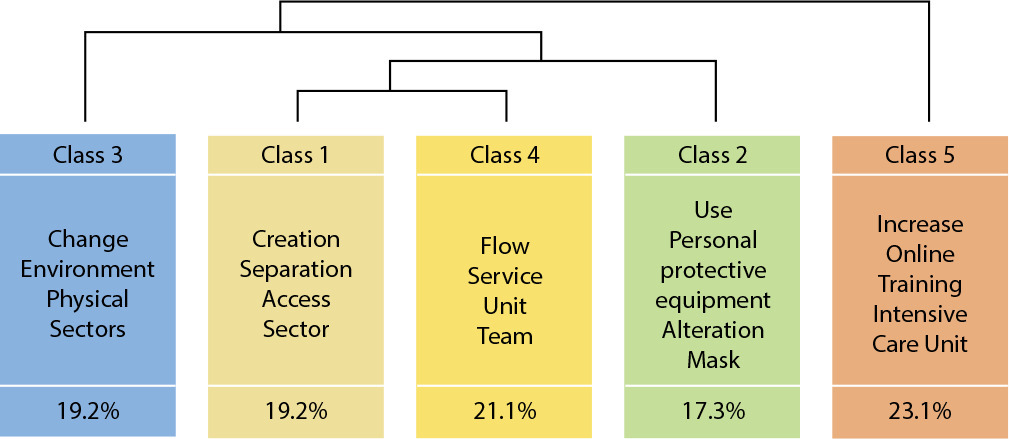
-
ORIGINAL ARTICLE10-21-2019
Permanent education for good practices in the prevention of pressure injury: almost-experiment
Revista Brasileira de Enfermagem. 2019;72(6):1646-1652
Abstract
ORIGINAL ARTICLEPermanent education for good practices in the prevention of pressure injury: almost-experiment
Revista Brasileira de Enfermagem. 2019;72(6):1646-1652
DOI 10.1590/0034-7167-2018-0778
Views0See moreABSTRACT
Objective:
To verify the effectiveness of the educational intervention through the evaluation of nurses’ knowledge about prevention of pressure injury.
Method:
A quasi-experimental study with a single group, carried out with 95 nurses from a teaching hospital in the interior of Minas Gerais, in August and September 2017. As a teaching strategy, the active methodology and hybrid teaching were used, based on the reference of the Method of the Arch of Charles Maguerez. Data were collected from a validated instrument, called the Pieper Knowledge Test, and analyzed by descriptive statistics and Student’s t-test with significance level of p <0.001.
Results:
The mean number of correct answers obtained by the nurses was 78.8% in the pre-test and 88.8% in the post-test, and the difference was statistically significant (p <0.001).
Conclusion:
The educational intervention developed was effective, since it contributed to the improvement of nurses’ knowledge.

-
ORIGINAL ARTICLE12-05-2019
Nurse care for the hospitalized elderly’s spiritual dimension
Revista Brasileira de Enfermagem. 2019;72:236-242
Abstract
ORIGINAL ARTICLENurse care for the hospitalized elderly’s spiritual dimension
Revista Brasileira de Enfermagem. 2019;72:236-242
DOI 10.1590/0034-7167-2018-0685
Views0See moreABSTRACT
Objective:
to analyze the nurse care for the spiritual hospitalized elderly’s dimension.
Method:
a qualitative study, based on Jean Watson’s Theory of Human Caring. The study included 17 nurses working in a geriatric center in Salvador City, Bahia State, Brazil. The collection of testimonies occurred between January and April of 2018, through an interview.
Results:
spiritual care were dialogue, encouragement and respect for religious activities, embracement, empathy. One of the obstacles to providing this care was the lack of preparation in accessing the elderly’s spiritual dimension.
Final considerations:
spirituality is a dimension of human and holistic nursing care. Caring for the spirit contributes to foster transpersonal care. The difficulty may be in the lack of nurses’ preparation. It is necessary that they cultivate and live their own spirituality, transmitting the understanding in each care relationship.
-
EXPERIENCE REPORT04-03-2020
Use of webQDA software on qualitative nursing research: an experience report
Revista Brasileira de Enfermagem. 2020;73(3):e20180411
Abstract
EXPERIENCE REPORTUse of webQDA software on qualitative nursing research: an experience report
Revista Brasileira de Enfermagem. 2020;73(3):e20180411
DOI 10.1590/0034-7167-2018-0411
Views0See moreABSTRACT
Objectives:
to report the user experience of the webQDA software in the support of qualitative data analysis about health literacy of older adults.
Methods:
quasi-experimental research developed from January 2014 to January 2015, with 118 older adults, all of whom were interviewed to assess the level of health literacy. Interviews were carried out before and after four educational interventions, according to Freire’s method named Culture Circle. The interviews were transcribed and entered in the software, which highlighted the analytical categories.
Results:
the systems of sources, interpretative encoding and questioning of the data available in the software allowed the construction of three categories for the literacy levels and four categories for their dimensions.
Final considerations:
We concluded that the webQDA software enables the structured encoding of qualitative materials, ensuring faster and effective management of data with systematization and analytical transparency.

-
03-03-2021
Concept analysis of Perioperative Thirst for the development of a new nursing diagnosis
Revista Brasileira de Enfermagem. 2021;74(1):e20200065
Abstract
Concept analysis of Perioperative Thirst for the development of a new nursing diagnosis
Revista Brasileira de Enfermagem. 2021;74(1):e20200065
DOI 10.1590/0034-7167-2020-0065
Views1See moreABSTRACT
Objectives:
to analyze the perioperative thirst concept for the development of a new diagnostic structure according to NANDA International.
Methods:
a concept analysis study based on the framework proposed by Walker and Avant, instrumentalized through an integrative literature review based on SCOPUS, CINAHL, PUBMED, LILACS, and WOS. The elaboration of the diagnostic structure followed NANDA International guidelines.
Results:
41 studies were analyzed revealing that perioperative thirst is prevalent and intense, having visceral and behavioral attributes as the core of the concept. Antecedents indicate that surgical patients are vulnerable to thirst; and consequents 16 signs and symptoms were organized and model cases were developed. A diagnostic structure has been developed for perioperative thirst.
Final Considerations:
concept analysis allowed language standardization that describes thirsty patients, helping the identification, planning of actions and communication of perioperative nursing care.
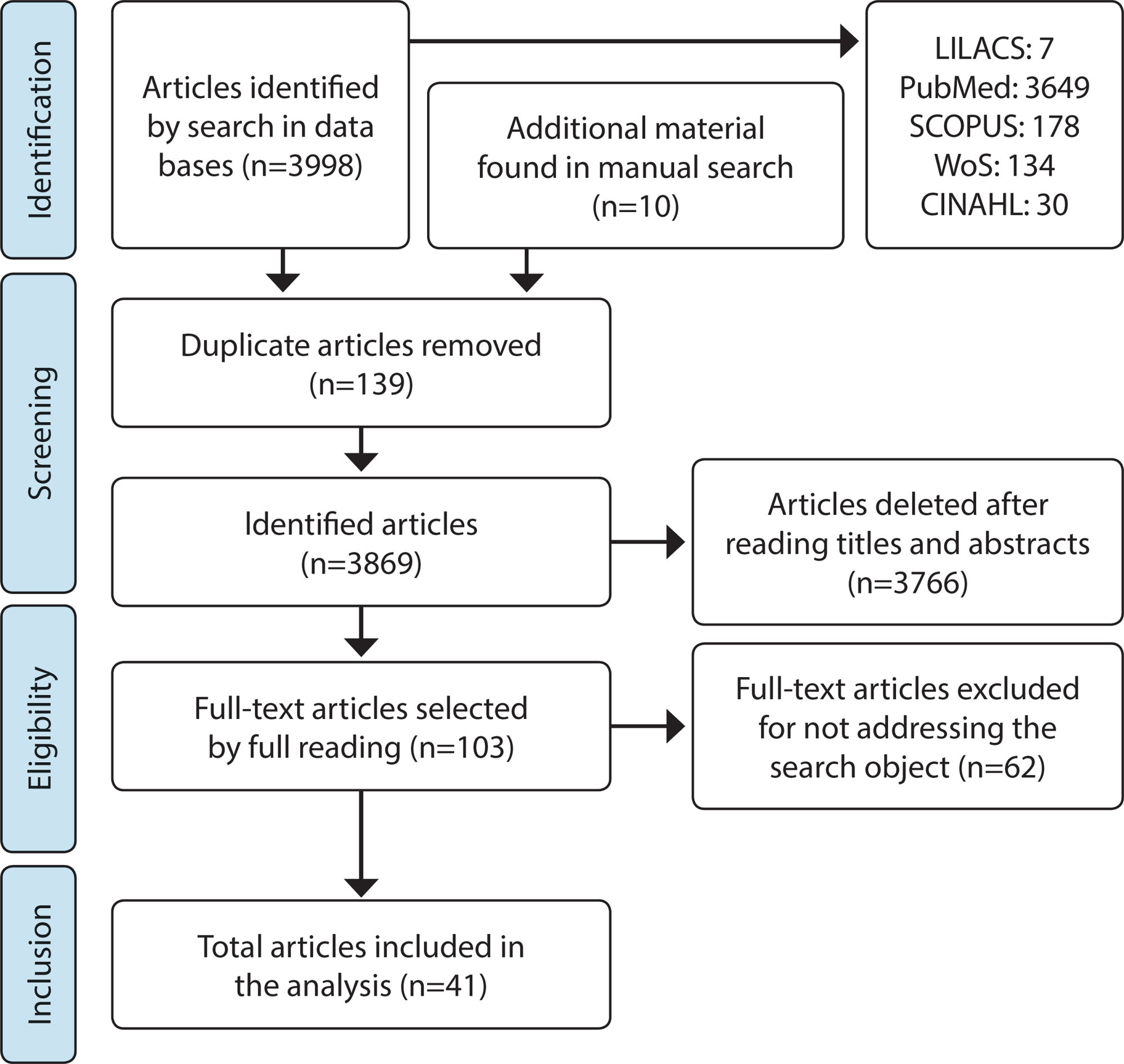
-
REFLECTION05-11-2022
Nursing Process in the Brazilian context: reflection on its concept and legislation
Revista Brasileira de Enfermagem. 2022;75(6):e20210898
Abstract
REFLECTIONNursing Process in the Brazilian context: reflection on its concept and legislation
Revista Brasileira de Enfermagem. 2022;75(6):e20210898
DOI 10.1590/0034-7167-2021-0898
Views0See moreABSTRACT
Objectives:
to reflect on the global understanding of the Nursing Process concept, with emphasis on the Brazilian context.
Methods:
a reflection article, aligned with the vision and expertise of researchers who are members of the Nursing Process Research Network.
Results:
the reflection is presented in two main topics: The evolution of Systematization of Nursing Care X Nursing Process concepts and its consonance with national and international practices, and Brazilian legislation; The Nursing Process concept realignment in Brazilian legislation in line with current care, teaching and research practices. Final Considerations: the reflections were oriented to the Nursing Process’ conceptual, normative and legal issues, including elements of its historical evolution, and, with that, pointed to the need to modify the Brazilian regulation on the Nursing Process.
-
ORIGINAL ARTICLE09-07-2020
Creation and validation of a visual educational technology content for lactation physiology learning
Revista Brasileira de Enfermagem. 2020;73(6):e20190564
Abstract
ORIGINAL ARTICLECreation and validation of a visual educational technology content for lactation physiology learning
Revista Brasileira de Enfermagem. 2020;73(6):e20190564
DOI 10.1590/0034-7167-2019-0564
Views0See moreABSTRACT
Objective:
to create and validate a visual educational technology content for lactation physiology learning.
Method:
a methodological study that contemplated the stages of content creation and validation guided by the conceptual model of Knowledge Translation into action. The creation took place in partnership with the educational technology center of the project’s home institution. The validation was attended by 27 judges with experience in the obstetric, neonatal, pediatric or maternal and child areas and in the theme of breastfeeding.
Results:
an educational technology covered animation and video techniques to locate, respectively, elements of lactation physiology and the population involved. An Overall Content Validity Index of 0.84 was obtained.
Conclusion:
the visual educational technology for lactation physiology learning has been validated in content as a tool to introduce the theme and mediate health education actions that can have a positive impact on breastfeeding.
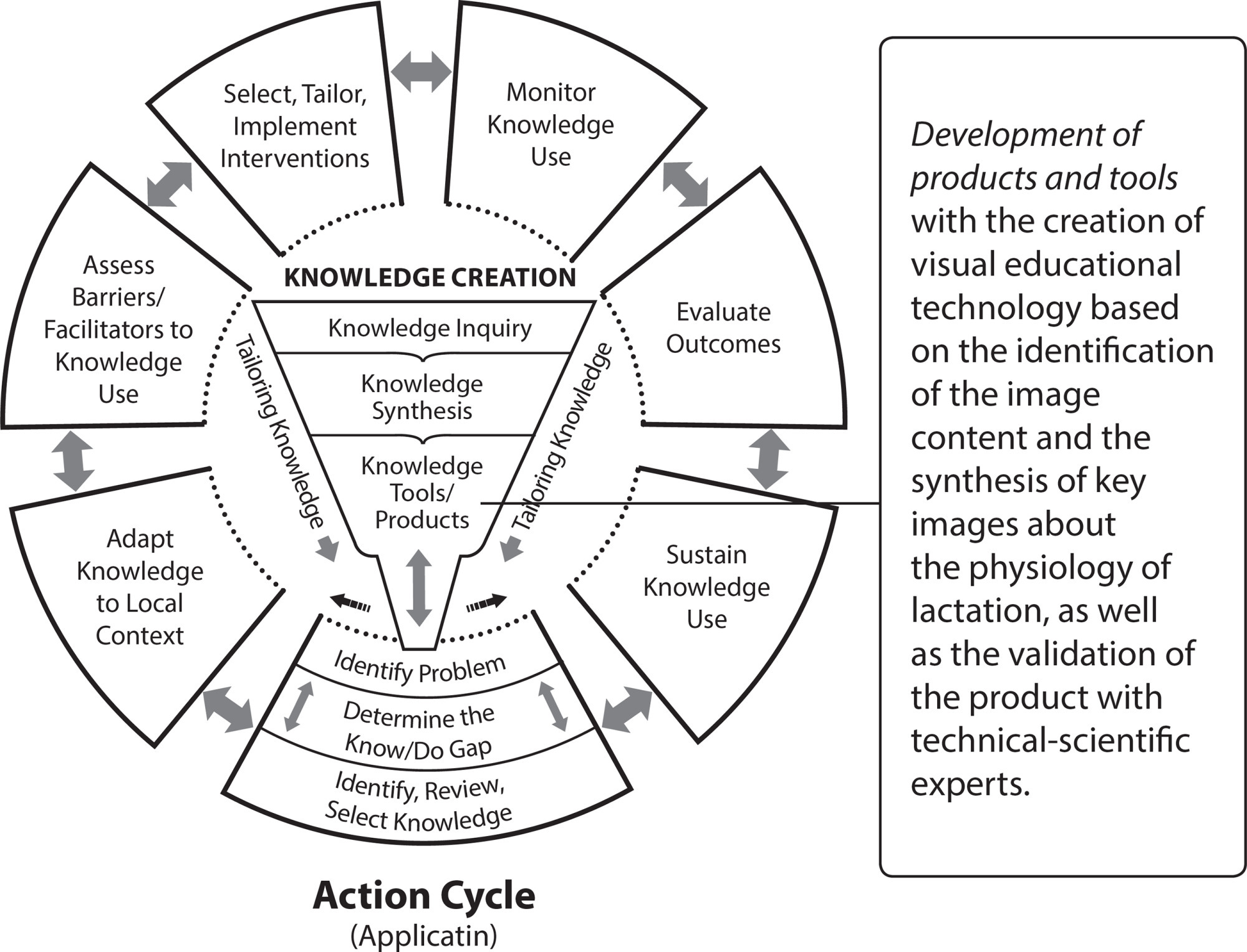
-
ORIGINAL ARTICLE08-20-2021
Risk of suicide among nursing students
Revista Brasileira de Enfermagem. 2021;74(6):e20200867
Abstract
ORIGINAL ARTICLERisk of suicide among nursing students
Revista Brasileira de Enfermagem. 2021;74(6):e20200867
DOI 10.1590/0034-7167-2020-0867
Views0See moreABSTRACT
Objectives:
to identify the risk and degree of risk of suicide in nursing students of a public institution in the countryside of Pernambuco, Brazil.
Methods:
this was a cross-sectional, quantitative research conducted with 150 students. For data collection, a sociodemographic questionnaire and the instrument, M.I.N.I. – Brazilian version 5.0.0 – Module C – Risk of suicide were used. Statistical analyses were performed with IBM(® )SPSS(®), version 23.
Results:
53.3% of nursing students had a risk of suicide, of which 20.7% had a high risk. Moreover, 22.67% reported previous suicide attempt. It is noteworthy that students without a partner have a higher risk of suicide (56.8%) than those with a partner (29.4%).
Conclusions:
it is perceived the need to develop programs that identify students at risk of suicide in higher education institutions, in order to raise awareness of the problem and implement policies to promote mental health in the academia.
Search
Search in:
Nuvem de Tags
Adolescente (85) Atenção Primária à Saúde (239) COVID-19 (91) Criança (91) Cuidados de Enfermagem (269) Educação em Enfermagem (151) Educação em Saúde (139) Enfermagem (930) Enfermagem Pediátrica (86) Estudantes de Enfermagem (77) Estudos de Validação (131) Família (87) Idoso (208) Promoção da Saúde (99) Qualidade de Vida (104) Saúde do Trabalhador (86) Saúde Mental (145) Saúde Pública (82) Segurança do Paciente (150) Tecnologia Educacional (100)



